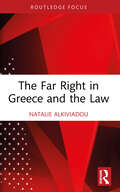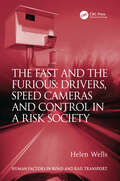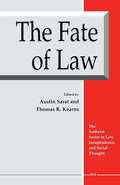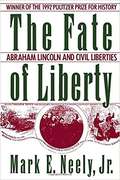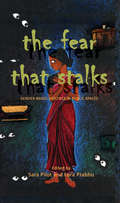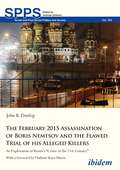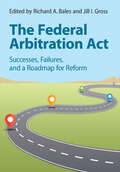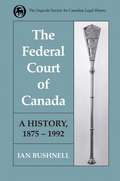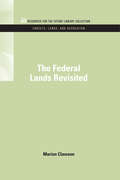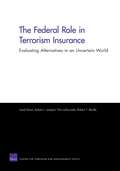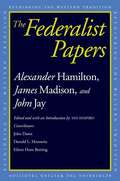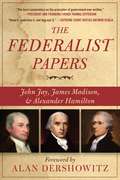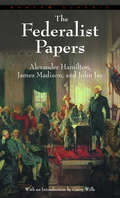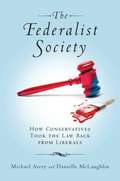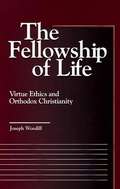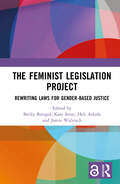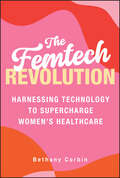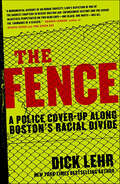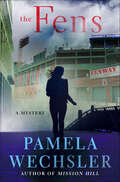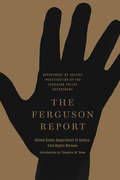- Table View
- List View
The Far Right in Greece and the Law
by Natalie AlkiviadouThis book critically evaluates the rise of the far-right in Greece, detailing the legal context in which to understand both the emergence of Golden Dawn, the far-right’s largest grouping, and the 2020 court decision, in which it was deemed to be a criminal organisation. Golden Dawn was a political party which, for years, also functioned as a violent subculture movement, with limited to no interference by the state. This book sets out the background to its rise in Greece, tracing its development from the post-Junta era. At the same time, the book provides an assessment of the legal framework within which the far-right has operated, and the legal tools available to tackle it – including criminal law, non-discrimination law, the laws governing political parties and the public order framework, and the country’s international and European obligations. Golden Dawn functioned as both a political party and violent entity until its leadership and parliamentary members were found guilty of leading and participating in a criminal organisation. This book demonstrates that the state of impunity in which Golden Dawn’s violent hit squads functioned was both a facilitating factor for its rise, and potentially for its demise, as the group potentially felt untouchable. And its attention to how Greek Law has tackled, and failed to tackle, Golden Dawn offers a timely and more generally useful assessment of how legislation, courts and policies can best challenge the far-right. This book will be of interest to those teaching and studying in law and politics, as well as more others, concerned with the rise of the far right and violent organizations, especially in Europe.
The Far-Right in International and European Law (Routledge Research in International Law)
by Natalie AlkiviadouSince the Second World War, the international community has sought to prevent the repetition of destructive far-right forces by establishing institutions such as the United Nations and by adopting documents such as the Universal Declaration of Human Rights. Jurisprudence and conventions directly prohibit far-right speech and expression. Nevertheless, recently, violent far-right entities, such as Golden Dawn of Greece, have received unprecedented electoral support, xenophobic parties have done spectacularly well in elections; and countries such as Hungary and Poland are being led by right-wing populists who are bringing constitutional upheaval and violating basic elements of doctrines such as the rule of law. In light of this current reality, this book critically assesses the international and European tools available for States to regulate the far-right. It conducts the analysis through a militant democracy lens. This doctrine has been considered in several arenas as a concept more generally; in the sphere of the European Convention on Human Rights; in relation to particular freedoms, such as that of association; and as a tool for challenging the far-right movement through the spectrum of political science. However, this doctrine has not yet been applied within a legal assessment of challenging the far-right as a single entity. After analysing the aims, objectives, scope and possibility of shortcomings in international and European law, the book looks at what state obligations arise from these laws. It then assesses how freedom of opinion and expression, freedom of association and freedom of assembly are provided for in international and European law and explores what limitation grounds exist which are directly relevant to the regulation of the far-right. The issue of the far-right is a pressing one on the agenda of politicians, academics, civil society and other groups in Europe and beyond. As such, this book will appeal to those with an interest in International, European or Human rights Law and political science.
The Farm and the City: Rivals or Allies
by Prentice-HallContrasts and compares the growth of city versus farm land, describes the concern over farmers moving westward and demographic transitions, and questions the validity of steps to preserve and encourage the contemporary agronomist.
The Fast and The Furious: Drivers, Speed Cameras and Control in a Risk Society (Human Factors in Road and Rail Transport)
by Helen WellsThe Fast and The Furious: Drivers, Speed Cameras and Control in a Risk Society presents a sociological and criminological perspective critical to understanding the driver's role at the centre of road safety interventions. Such an approach is, it is argued, as crucial to an understanding of attempts to reduce road crashes, deaths and injuries as approaching such questions from an engineering or educational perspective. The book offers an explanation for the continued debate about one road safety intervention - the speed camera - by situating that debate within contemporary literature about the 'risk society' (Beck, 1992) and more broadly understood experiences of risk faced on a daily basis by drivers. Rather than a focus on risk as something that can be objectively assessed, measured and managed separately from the social context in which it is encountered, it suggests that 'risk' is something that permeates this particular debate from every angle. The book achieves its aims by utilising sociological and criminological perspectives to investigate issues such as: - the social context in which it is possible for drivers to reject official scientific expertise about crash causation and camera effectiveness - the self-defined 'respectability' of the population being problematised and its juxtaposition with a 'proper' police focus on 'real criminals' - the reconceptualisation of law-breaking as risk-taking rather than inherently 'wrong' behaviour and its consequences for the enforcement of laws based on risk assessment - the experience of being controlled by technology and of receiving what is essentially 'automated justice'. These and other issues are explored and suggested as illuminating of both the real concerns underpinning this debate and potentially instructive for future attempts to control risky behaviour both within and beyond a road safety context.
The Fate of Law
by Austin Sarat Thomas R. KearnsMidst the rising clamor of voices declaring that the law is dead in the US, five original essays discuss the law's problems and prospects in the context of feminism, postmodernism, and other current movements and theories.
The Fate of Liberty: Abraham Lincoln and Civil Liberties
by Mark E. NeelyOne of America's leading authorities on Lincoln wades straight into this controversy, showing just who was jailed and why, even as he explores the whole range of Lincoln's constitutional policies.<P><P> Pulitzer Prize Winner
The Fatigue of the Shari‘a
by Ahmad Atif AhmadThe Fatigue of the Shari'a places on a continuum two kinds of debates: debates in the Islamic tradition about the end of access to divine guidance and debates in modern scholarship in Islamic legal studies about the end of the Shari'a. The resulting continuum covers what access to divine guidance means and how it relates to Shari'a.
The Fear that Stalks: Gender-based Violence in Public Spaces
by Edited by Sara Pilot Lora PrabhuThis book is an attempt to understand the causes, nature and consequences of gender-based violence in public spaces. It provides a framework that locates gender based violence within the politics and dynamics of public space, and helps us to understand the commonality between these diverse forms of violence, ranging from sexual harassment, sexual assault, moral policing, 'honour' killing, acid throwing, witch hunting, parading naked, tonsuring, rape and homicide. The writers unpack and examine the idea of a 'public' space: although by and large a notional space, they begin by identifying it as the geographical space between the home and the workplace and then, go beyong this to look at the violation faced by homeless women and girls who live on the streets, as well as those who work in public spaces in the unorganised sector.
The February 2015 Assassination of Boris Nemtsov and the Flawed Trial of His Alleged Killers: An Exploration of Russia’s “Crime of the 21st Century” (Soviet and Post-Soviet Politics and Society #185)
by John B. DunlopThis book provides a detailed description of “the Russian crime of the twenty-first century” as well as a thorough examination of the eighty sessions of the nine-month-long trial (during 2016-2017) of Boris Nemtsov’s alleged killers. It directs attention to the chief obstacle in determining what precisely happened shortly before midnight on February 27, 2015, on a bridge located a mere stone’s throw away from the Kremlin, in an area under the active surveillance of the Russian Federal Protective Service. The glaring absence of closed circuit videos from this most heavily guarded site in Russia is underscored. Given the absence of such key evidence, those seeking to investigate the murder have been stumbling about in obscurity.The attempts to penetrate this man-made fog undertaken during the course of the trial by the Nemtsov family attorneys, Vadim Prokhorov and Olga Mikhailova, as well as by numerous tenacious analysts of the crime, such as former deputy Russian energy minister Vladimir Milov, former Russian presidential economics adviser Andrei Illarionov, and leading mathematician Andrei Piontkovskii, are covered in full. The uneven case mounted by the prosecution and the scrappy defense effort of the attorneys for the alleged killers, many of them ethnic Chechens, are highlighted, as is the non-unanimous verdict which was reached by the twelve jurors. The findings of this study are in agreement with those of a number of commentators who contend that the actual organizers of the crime remain at large as does the assassination’s shadowy mastermind.
The Federal Arbitration Act: Successes, Failures, and a Roadmap for Reform
by Richard A. BalesIn honor of the 100th anniversary of the Federal Arbitration Act, this volume brings together a diverse group of leading scholars and practitioners to celebrate its successes and propose specific reforms. Readers will gain insight into how the Federal Arbitration Act impacts the modern practice of arbitration and how the Supreme Court's interpretation of the Act undermines its fairness. Focusing on domestic, commercial and consumer, as well as securities and labor and employment arbitration, this book provides a roadmap to enhance the fairness and coherence of the Act. The volume is unique in that it serves as the impetus for a law reform project, with over thirty scholars speaking collectively for improvements to the law. More effective than scattershot arguments, this coordinated effort delivers a consistent message to a national audience: that arbitration has become ubiquitous and the law should ensure it is fair and equitable.
The Federal Court of Canada: A History, 1875-1992 (The Royal Society of Canada Special Publications)
by Ian BushnellThe Federal Court of Canada, which existed from 1875 to 1971 under the name Exchequer Court of Canada, occupies a special place in the court structure of Canada. It was founded principally to adjudicate legal disputes in which the Canadian government was involved; since its change of name in 1971 it has become primarily an administrative appeal court dealing with the review of decisions made by federal administrative tribunals in addition to its existing jurisdictions, admiralty, intellectual property, tax, and other areas. As a federal court within the nation, its very existence has provoked discussion and debate as the various provincial court systems claim a position of primacy within our society for the adjudication of legal disputes.Central to this history of the Court is an examination of the judges who have sat on its bench. Bushnell investigates who the judges have been and examines their work, with particular focus on the judges' views of the proper approach to decision-making. His study contains a wealth of information, much of which may not be widely known in the profession. As such, The Federal Court of Canada constitutes a rich source both for those with a legal background and for those with an interest in the working and history of legal institutions.
The Federal Farm Fable
by Paul FindleyThe Federal Farm Fable attempts to analyze America's farm policies in the Sixties and to suggest proposals for remedying our present farm problems in concern for American Agriculture.
The Federal Lands Revisited (RFF Forests, Lands, and Recreation Set)
by Marion ClawsonPublic land management and ownership came under increasing scrutiny in the 1980s, partly because of the increased value of federal lands; prized for their timber, minerals, energy, and amenity outputs. The personal touch and wisdom of one of these prolific and thoughtful writers on land use issues ensure that this book is a valuable addition to a literature to which Dr. Clawson already has made enormous contributions. For its readers, this book provides fresh insights and suggests new approaches to a problem that has been heavily discussed.
The Federal Role in Terrorism Insurance
by Robert J. Lempert Tom Latourrette Lloyd Dixon Robert T. RevilleWhat are the Terrorism Risk Insurance Act's effects on the market for terrorism insurance? What would be the effect of enhancing provisions for nuclear, biological, chemical, and radiological (NBCR) attacks? The authors conclude that the program yields positive outcomes in a number of dimensions for conventional attacks and identify specific reforms that can improve results for NBCR attacks.
The Federalist Papers
by Alexander Hamilton James Madison John Jay Ian ShapiroThis authoritative edition of the complete texts of the Federalist Papers, the Articles of Confederation, the U. S. Constitution, and the Amendments to the U. S. Constitution features supporting essays in which leading scholars provide historical context and analysis. An introduction by Ian Shapiro offers an overview of the publication of the Federalist Papers and their importance. In three additional essays, John Dunn explores the composition of the Federalist Papers and the conflicting agendas of its authors; Eileen Hunt Botting explains how early advocates of women’s rights, most prominently Mercy Otis Warren, Judith Sargent Murray, and Charles Brockden Brown, responded to the Federalist-Antifederalist debates; and Donald Horowitz discusses the Federalist Papers from the perspective of recent experiments with democracy and constitution-making around the world. These essays both illuminate the original texts and encourage active engagement with them.
The Federalist Papers
by Alexander Hamilton James Madison John JayNow introduced by eminent civil libertarian, constitutional scholar, and New York Times bestselling author Alan Dershowitz, The Federalist Papers are a must-have for all scholars of history and government and all Americans. Widely considered to be among the most important historical collections of all time, The Federalist Papers were intended to persuade New York at-large delegates to the Constitutional Convention to accept the newly drafted Constitution in 1787. Authored in parts by Hamilton, Madison, and Jay, together as the pseudonym of Publius, the documents have been referred to and heavily cited countless times in all aspects of American government and politics. Together, the eighty-five Federalist essays stand among the Constitution of the United States, the Declaration of Independence, Common Sense, and other work by the Founding Fathers that helped build and solidify the foundation of American democracy. With its rich history and a new introduction from Alan Dershowitz, one of the most prominent legal minds in the country, The Federalist Papers will educate you on the groundwork that shaped the greatest country in the world.
The Federalist Papers: Alexandrer Hamilton, James Madison And John Jay (Enriched Classics)
by Alexander Hamilton James Madison John JayThe Federalist Papers are a series of 85 articles or essays advocating the ratification of the United States Constitution.
The Federalist Society: How Conservatives Took the Law Back from Liberals
by Michael Avery Danielle McLaughlinOver the last thirty years, the Federalist Society for Law and Public Policy Studies has grown from a small group of disaffected conservative law students into an organization with extraordinary influence over American law and politics. Although the organization is unknown to the average citizen, this group of intellectuals has managed to monopolize the selection of federal judges, take over the Department of Justice, and control legal policy in the White House.Today the Society claims that 45,000 conservative lawyers and law students are involved in its activities. Four Supreme Court Justices--Antonin Scalia, Clarence Thomas, John Roberts, and Samuel Alito--are current or former members. Every single federal judge appointed in the two Bush presidencies was either a Society member or approved by members. During the Bush years, young Federalist Society lawyers dominated the legal staffs of the Justice Department and other important government agencies.The Society has lawyer chapters in every major city in the United States and student chapters in every accredited law school. Its membership includes economic conservatives, social conservatives, Christian conservatives, and libertarians, who differ with each other on significant issues, but who cooperate in advancing a broad conservative agenda. How did this happen? How did this group of conservatives succeed in moving their theories into the mainstream of legal thought? What is the range of positions of those associated with the Federalist Society in areas of legal and political controversy? The authors survey these stances in separate chapters onregulation of business and private property;race and gender discrimination and affirmative action;personal sexual autonomy, including abortion and gay rights; andAmerican exceptionalism and international law.
The Federalist Society: How Conservatives Took the Law Back from Liberals
by Michael Avery Danielle McLaughlinOver the last thirty years, the Federalist Society for Law and Public Policy Studies has grown from a small group of disaffected conservative law students into an organization with extraordinary influence over American law and politics. Although the organization is unknown to the average citizen, this group of intellectuals has managed to monopolize the selection of federal judges, take over the Department of Justice, and control legal policy in the White House. Today the Society claims that 45,000 conservative lawyers and law students are involved in its activities. Four Supreme Court Justices--Antonin Scalia, Clarence Thomas, John Roberts, and Samuel Alito--are current or former members. Every single federal judge appointed in the two Bush presidencies was either a Society member or approved by members. During the Bush years, young Federalist Society lawyers dominated the legal staffs of the Justice Department and other important government agencies. The Society has lawyer chapters in every major city in the United States and student chapters in every accredited law school. Its membership includes economic conservatives, social conservatives, Christian conservatives, and libertarians, who differ with each other on significant issues, but who cooperate in advancing a broad conservative agenda. How did this happen? How did this group of conservatives succeed in moving their theories into the mainstream of legal thought? What is the range of positions of those associated with the Federalist Society in areas of legal and political controversy? The authors survey these stances in separate chapters on • regulation of business and private property • race and gender discrimination and affirmative action • personal sexual autonomy, including abortion and gay rights • American exceptionalism and international law
The Fellowship Of Life: Virtue Ethics And Orthodox Christianity
by Joseph Woodill James F. KeenanBringing Orthodox Christianity into the recent dialog on virtue ethics, Joseph Woodill investigates the correspondences between the Eastern Orthodox tradition and contemporary virtue ethics, and he develops a distinctly Orthodox vision of theological ethics. This book fills a vacuum in our understanding of the Eastern Church by revealing themes, persons, and insights that offer resources for a contemporary moral theology. Reviewing the Eastern tradition from patristic times to the present, Woodill shows its relevance to contemporary virtue ethics and identifies both differences and similarities between Orthodox and other -- Catholic, Protestant, and Jewish -- virtue ethics.
The Feminist Legislation Project: Rewriting Laws for Gender-Based Justice
by Heli Askola Kate Seear Jamie Walvisch Becky BatagolIn this book, leading law academics along with lawyers, activists and others demonstrate what legislation could look like if its concern was to create justice for women.Each chapter contains a short piece of legislation – proposed in order to address a contemporary legal problem from a feminist perspective. These range across criminal law (sexual offences, Indigenous women’s experiences of criminal law, laws in relation to forced marriage, modern slavery, childcare and sentencing), civil law (aged care and housing rights, regulating the gig economy; surrogacy, gender equity in the construction industry) and constitutional law (human rights legislation, reimagining parliaments where laws are made for the benefit of women). The proposed laws are, moreover, drafted with feedback from a senior parliamentary draftsperson (providing guidance to contributors in a personal capacity), to ensure conformity with legislative rigour, as well as accompanied by an explanation of their reasons and their aims. Although the legislation is Australian-based, the issues raised by each are recognisably global, and are reflected in the legislation of most other nations.This first feminist legislation project will appeal to scholars of feminist legal studies, gender and the law, gender studies and others studying or working in relevant legal areas.
The Femtech Revolution: Harnessing Technology to Supercharge Women's Healthcare
by Bethany CorbinA book for every woman seeking to improve the quality of their healthcare Femtech, or female health technology, represents a groundbreaking field dedicated to leveraging innovation and technology to address the unique health needs of individuals with female biology. In The Femtech Revolution: Harnessing Technology to Supercharge Women's Healthcare, acclaimed health and innovation attorney, femtech entrepreneur, and influential thought leader Bethany Corbin delivers an empowering new playbook for anyone needing to understand and navigate this transformative new world This book equips you with the tools to safely and effectively harness femtech and digital health solutions while addressing critical issues like data privacy, device accuracy, and product reliability. Corbin's insights will guide you through the complexities of contemporary women's healthcare and empower you to take control of your health in the digital age. Inside, you'll find: The SAFE Method: Corbin's powerful framework for quickly evaluating and vetting femtech products Smart strategies for becoming a savvy consumer of digital health technology that is accurate, effective, and scientifically sound A deep dive into the femtech revolution tackling women's healthcare challenges with groundbreaking, tailored solutions Privacy protection tips to ensure new healthcare solutions don't compromise your personal data in a post-Roe v. Wade world A roadmap for transforming lackluster healthcare through cutting-edge femtech innovations, and the real-life stories of women doing exactly this Perfect for everyone seeking better healthcare outcomes, The Femtech Revolution helps you confidently explore innovations designed with your needs in mind—and not just those of a system historically built by and for cisgender men. It's an invaluable resource for cisgender women, and trans and nonbinary people.
The Fence: A Police Cover-up Along Boston's Racial Divide
by Dick Lehr“A monumental account of an urban travesty….[It] has all the earmarks of a classic.”—Dennis Lehane, New York Times bestselling author of Mystic River and Shutter IslandDick Lehr’s The Fence, subtitled, “A Police Cover-up Along Boston’s Racial Divide,” is a shocking true story of racism, brutality, official lies and negligence, when the truth about the savage beating of black plainclothes policeman by white officers was hidden behind a “blue wall of silence.” Respected journalist Lehr, winner of the Hancock Award, the Loeb Award, finalist for the Pulitzer Prize, and bestselling author of Black Mass and Judgment Ridge, sheds a brilliant light on all aspects of this powerful, disturbing event and its aftermath.
The Fens: A Mystery (The Abby Endicott Novels #3)
by Pamela WechslerPamela Wechsler's enthralling series returns with The Fens, and promises to shock readers old and new.Boston’s chief homicide prosecutor Abby Endicott hasn't had the easiest adjustment to normal life. Her wealthy family cut her off because they don’t agree with her dangerous career choice, her new apartment with her musician boyfriend is not up to standards, and her impending position as godmother is overwhelming. Abby's personal life, however, is about to be put on hold when the star catcher for the Red Sox goes missing on opening day.Abby quickly realizes this is more than a case of one missing celebrity. Soon, another player turns up dead and the frantic search escalates. When Abby discovers greased baseballs and mysterious sums of cash, she knows that a lot more than the Red Sox's season is in danger.
The Ferguson Report
by United States Civil Rights Division Theodore M. ShawOn August 9, 2014, Michael Brown, an unarmed African American high school senior, was shot by Officer Darren Wilson in Ferguson, Missouri. For months afterward, protestors took to the streets demanding justice, testifying to the racist and exploitative police department and court system, and connecting the shooting of Brown with the deaths of Trayvon Martin, Eric Garner, and other young black men at the hands of police across the country.In the wake of these protests, the Department of Justice launched a six-month investigation, resulting in a report that Colorlines characterizes as "so caustic it reads like an Onion article" and laying bare what the Huffington Post calls "a totalizing police regime beyond any of Kafka's ghastliest nightmares." Among the report's findings are that the Ferguson Police Department "Engages in a Pattern of Unconstitutional Stops and Arrests in Violation of the Fourth Amendment," "Detain[s] People Without Reasonable Suspicion and Arrest[s] People Without Probable Cause," "Engages in a Pattern of First Amendment Violations," "Engages in a Pattern of Excessive Force," and "Erode[s] Community Trust, Especially Among Ferguson's African-American Residents."Contextualized here in a substantial introduction by renowned legal scholar and former NAACP Legal Defense and Educational Fund president Theodore M. Shaw, The Ferguson Report is a sad, sobering, and important document, providing a snapshot of American law enforcement at the start of the twenty-first century, with resonance far beyond one small town in Missouri.
